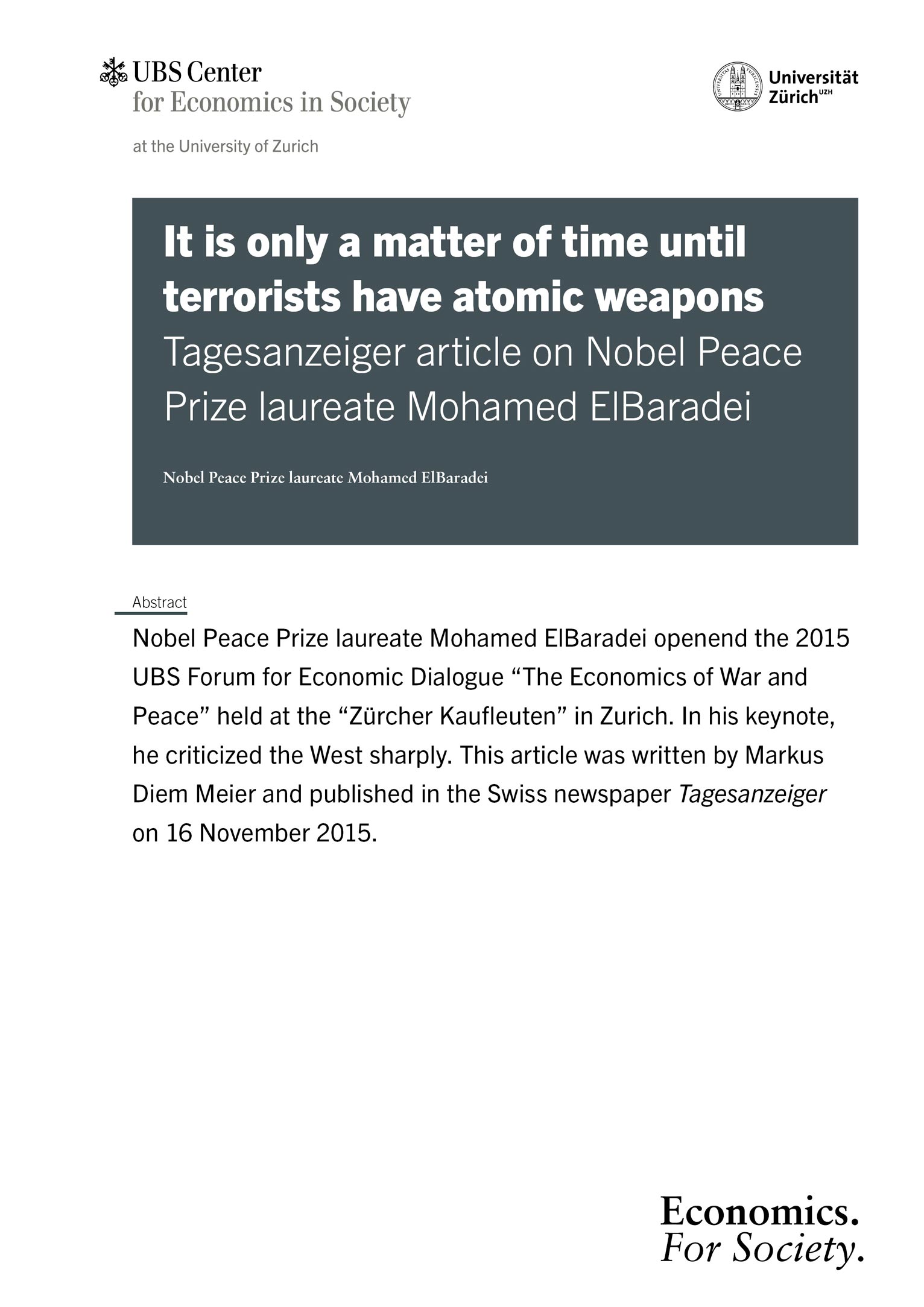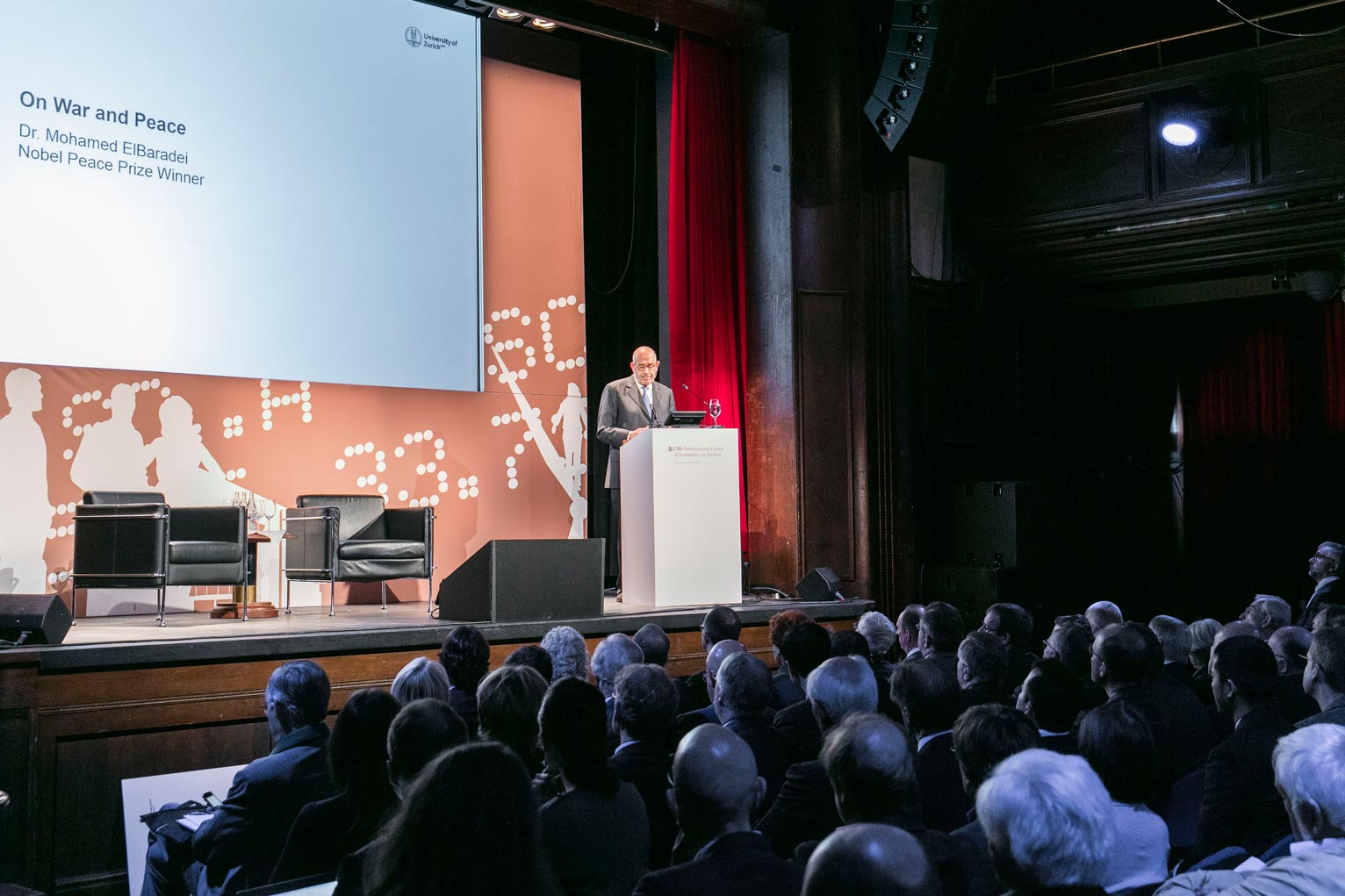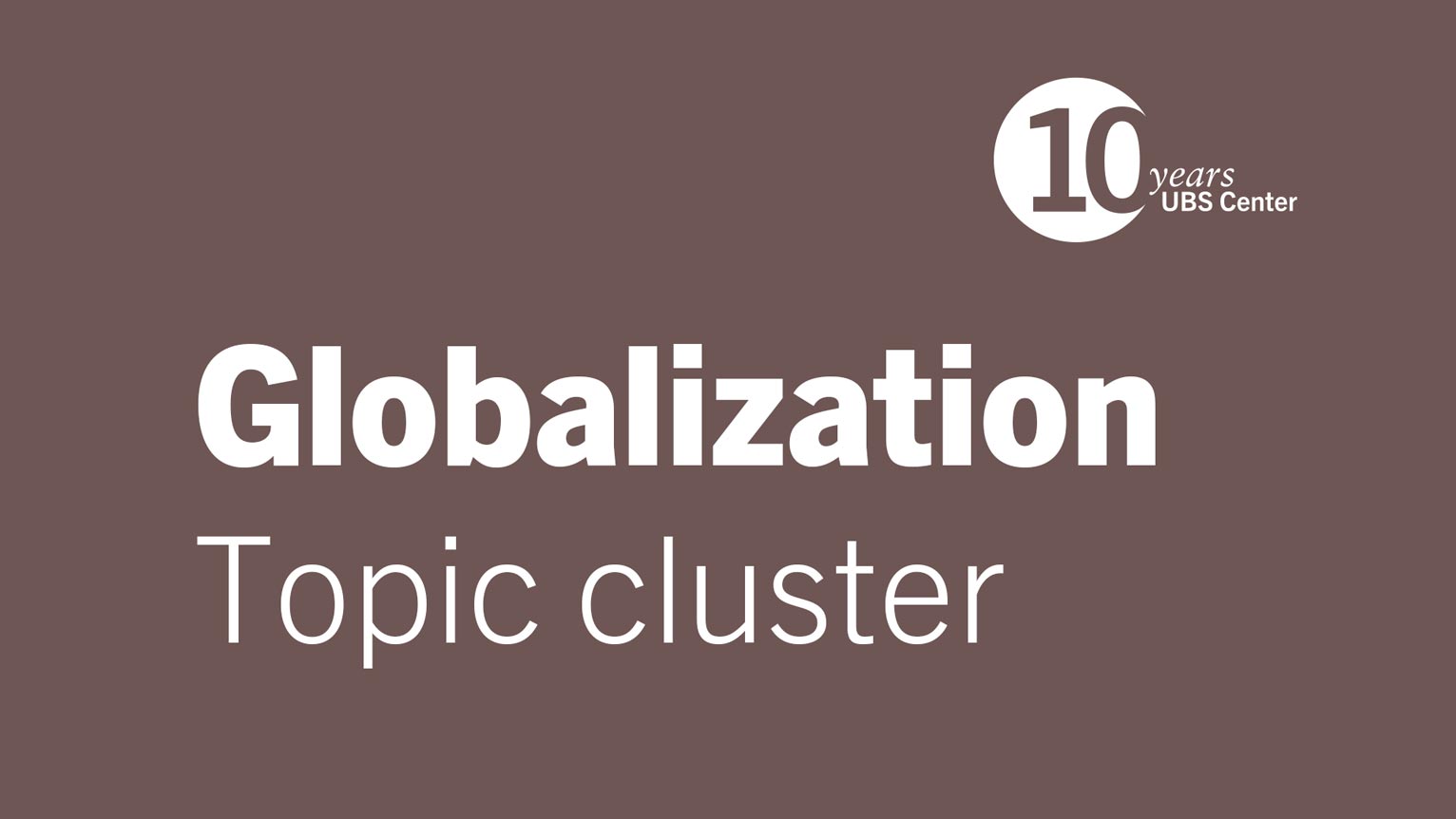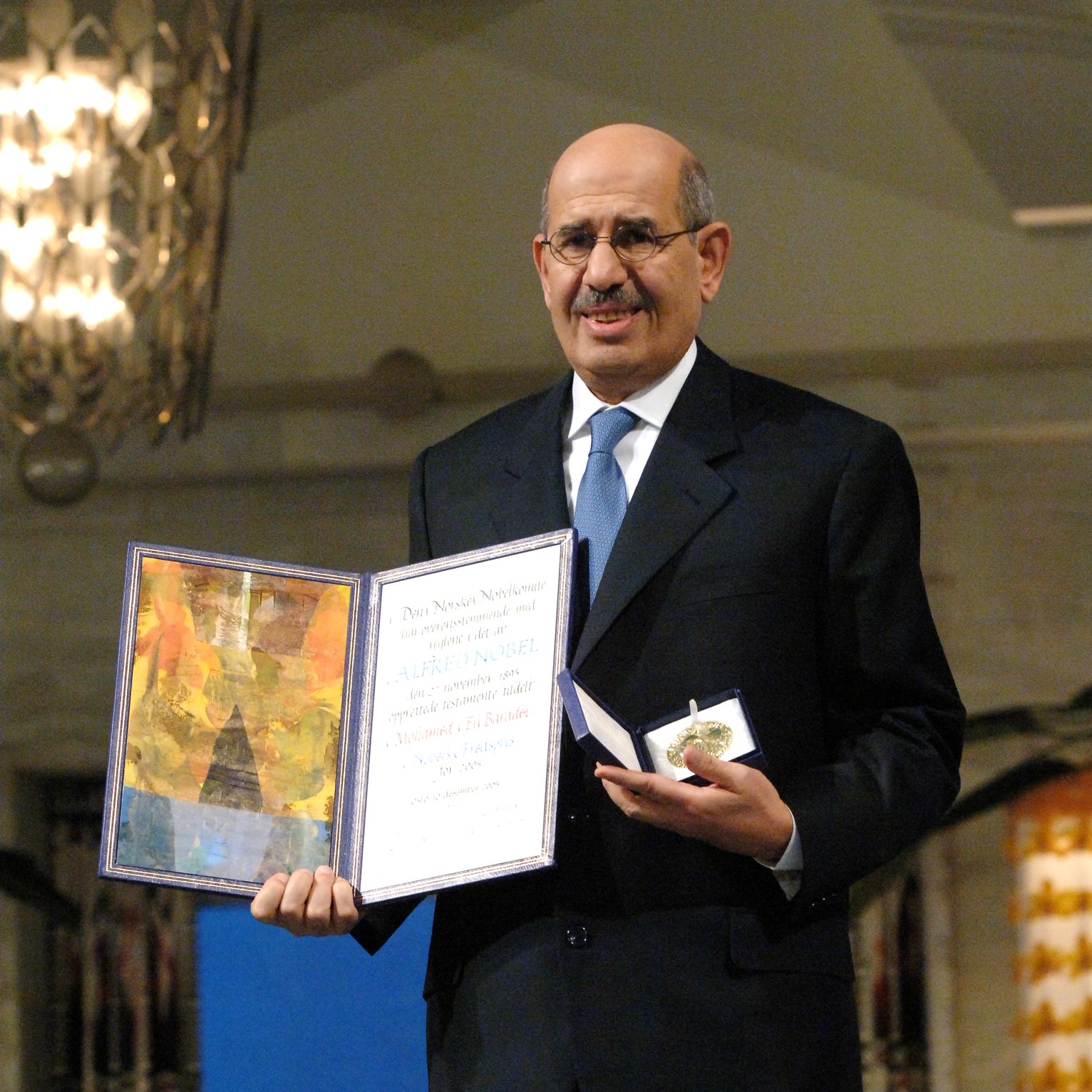It is only a matter of time
Nobel peace laureate Mohamed ElBaradei delivered the keynote speech at the UBS Center Forum for Economic Dialogue on The Economics of War and Peace in Zurich. In his keynote, he criticized the West sharply. This article was written by Markus Diem Meier and originally published in Swiss daily Tagesanzeiger on 16 November 2015.
This summary is part of a compilation of speeches delivered by Nobel laureates at UBS Center events. We invite you to explore our Nobel Opinions and find out more about their research, their vision, and their solutions to address some of the most pressing issues of our time.
Nobel peace laureate Mohamed ElBaradei delivered the keynote speech at the UBS Center Forum for Economic Dialogue on The Economics of War and Peace in Zurich. In his keynote, he criticized the West sharply. This article was written by Markus Diem Meier and originally published in Swiss daily Tagesanzeiger on 16 November 2015.
This summary is part of a compilation of speeches delivered by Nobel laureates at UBS Center events. We invite you to explore our Nobel Opinions and find out more about their research, their vision, and their solutions to address some of the most pressing issues of our time.

The economics of war and peace
The headline keynote speaker Nobel Prize Winner Mohamed ElBaradei opened the UBS Center Forum in 2015 with a powerful and moving address. He argued the world is facing a crisis of governance as faith and confidence in global institutions crumble and nations pursue their own interests often to the detriment of others. He sees this as unsustainable, as we live in an increasingly interconnected world, where traditional notions of security and sovereignty are being challenged. The solution he advocated for is a global social contract based on inclusion and fostering solidarity.
As for the ongoing crisis in the Middle East, ElBaradei identified several underlying causes for these conflicts, including the lack of democratic culture, good institutions, and social cohesion. In particular education will be key in making progress on all those fronts. However, he also made clear that no part of the world can be quarantined from these conflicts any longer, and that the West has an important role to play. He thus ended his address with a plea to rebuild international structures of cooperation, conflict prevention, and humanitarian and development aid, stating that “we either swim together, or sink together.”
The headline keynote speaker Nobel Prize Winner Mohamed ElBaradei opened the UBS Center Forum in 2015 with a powerful and moving address. He argued the world is facing a crisis of governance as faith and confidence in global institutions crumble and nations pursue their own interests often to the detriment of others. He sees this as unsustainable, as we live in an increasingly interconnected world, where traditional notions of security and sovereignty are being challenged. The solution he advocated for is a global social contract based on inclusion and fostering solidarity.
As for the ongoing crisis in the Middle East, ElBaradei identified several underlying causes for these conflicts, including the lack of democratic culture, good institutions, and social cohesion. In particular education will be key in making progress on all those fronts. However, he also made clear that no part of the world can be quarantined from these conflicts any longer, and that the West has an important role to play. He thus ended his address with a plea to rebuild international structures of cooperation, conflict prevention, and humanitarian and development aid, stating that “we either swim together, or sink together.”

Video
How to rewire globalization
The increasing interdependence of world economies is a key aspect of globalization which comes with a multitude of consequences for the world population. Yet there are numerous worrisome effects, commonly referred to as the globalization backlash. Resurgent nationalism and increasing populism, rejection of free trade, opposition to immigration, growing global inequality, and a retreat from multilateralism: These are the defining issues of our time that fuel the globalization backlash. What are the causes of these phenomena and what are effective solutions to address these issues? Answers to these and other important questions are provided by numerous experts in lectures, interviews, and papers made possible by the UBS Center.
The increasing interdependence of world economies is a key aspect of globalization which comes with a multitude of consequences for the world population. Yet there are numerous worrisome effects, commonly referred to as the globalization backlash. Resurgent nationalism and increasing populism, rejection of free trade, opposition to immigration, growing global inequality, and a retreat from multilateralism: These are the defining issues of our time that fuel the globalization backlash. What are the causes of these phenomena and what are effective solutions to address these issues? Answers to these and other important questions are provided by numerous experts in lectures, interviews, and papers made possible by the UBS Center.

Nobel Peace Prize 2005
The Nobel Peace Prize 2005 was awarded jointly to International Atomic Energy Agency (IAEA) and Mohamed ElBaradei “for their efforts to prevent nuclear energy from being used for military purposes and to ensure that nuclear energy for peaceful purposes is used in the safest possible way”.
Learn more on why proliferation of nuclear arms must be stopped.
The Nobel Peace Prize 2005 was awarded jointly to International Atomic Energy Agency (IAEA) and Mohamed ElBaradei “for their efforts to prevent nuclear energy from being used for military purposes and to ensure that nuclear energy for peaceful purposes is used in the safest possible way”.
Learn more on why proliferation of nuclear arms must be stopped.

Speaker
For the past two decades, Nobel Laureate Mohamed ElBaradei has played a key role in the most high-stakes conflicts of our time. Unique in maintaining credibility in the Arab world and the West alike, Dr. ElBaradei has emerged as a singularly independent, uncompromised voice. From 1997 to 2009 he was the Director General of the International Atomic Energy Agency (IAEA). ElBaradei and the IAEA were jointly awarded the Nobel Peace Prize in 2005. During his tenure at the IAEA, ElBaradei employed diplomacy to deal with nuclear rows over Iraq, North Korea and Iran, and insists that even in the most difficult situations, progress can be made. A prominent voice for peace, freedom and democracy in the Arab and Islamic worlds, he played a leadership role in the Arab Spring of 2011 and was asked to take on the responsibility of interim Vice President of Egypt, a position from which he resigned in 2013. ElBaradei has received many global awards for his work as a public servant and as an advocate of tolerance, humanity and freedom.
For the past two decades, Nobel Laureate Mohamed ElBaradei has played a key role in the most high-stakes conflicts of our time. Unique in maintaining credibility in the Arab world and the West alike, Dr. ElBaradei has emerged as a singularly independent, uncompromised voice. From 1997 to 2009 he was the Director General of the International Atomic Energy Agency (IAEA). ElBaradei and the IAEA were jointly awarded the Nobel Peace Prize in 2005. During his tenure at the IAEA, ElBaradei employed diplomacy to deal with nuclear rows over Iraq, North Korea and Iran, and insists that even in the most difficult situations, progress can be made. A prominent voice for peace, freedom and democracy in the Arab and Islamic worlds, he played a leadership role in the Arab Spring of 2011 and was asked to take on the responsibility of interim Vice President of Egypt, a position from which he resigned in 2013. ElBaradei has received many global awards for his work as a public servant and as an advocate of tolerance, humanity and freedom.